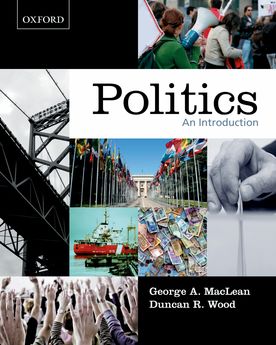Preface
From the Publisher
Acknowledgements
1Studying Politics
Why Study Politics?
Approaches Used in the Study of Politics
Politics and Our Everyday Lives
Division and Connection in a Changing World
Domestic and International Politics
Citizens and Canada
2Finding a Common Vocabulary: Political Concepts
Introduction: The Importance of a Common Language
Political Organization
Political Action
Values
Identity
3Political Thought, Philosophy, and Ideology
What is Political Philosophy?
The History of Political Thought
Ideologies
Liberal Thought
Socialism
Nationalism
Other Systems of Thought:
Conservatism
Feminism
Environmentalism
Fascism
Anarchism
Political Islam
The Relevance of Ideas
4The Role of Government
What Do Governments Do?
Some Shared Objectives of Government
Some Activities of Government
Schools of Thought Regarding the Role of Government
Forms of Political Systems
Liberal Democracy
Authoritarianism
Totalitarianism
Government and Canada
5Branches of Government
Institutions of Government
The Executive
The Legislature
Legislative functions
The Judiciary
Constitutionality ruling
Judicial legal interpretation
Judicial dispute adjudication
The Bureaucracy
Presidential and Parliamentary Systems
Institutions of Government
Government in Canada
Canadian federalism
Canadian courts and the Constitution
The Charter of Rights and Freedoms and individual citizens
Canadian law
6Political Systems
Distributing Power within the State: To Centralize or Share?
Unitary Systems
Federal Systems
Canadian Federalism: An Evolving History
The division of powers
The evolution of Canadian federalism
Quebec and Canadian federalism
7Political Participation: Elections and Parties
Democracy and Voting
Types of Electoral Systems
Political Parties
Election Campaigns
Campaign Financing
Direct Democracy and the Referendum
Elections and Political Parties in Canada
8Political Socialization and Culture
The Process of Political Participation
Political Culture
Political Socialization
Public Opinion
The Media and Politics
Civil Society and Non-governmental Organizations
The Participation of Private Actors in the Decision-Making Process
Interest Groups
Lobbying
Policy-communities
Corporatism
Canadian Political Culture and Socialization
9Politics in Developed States
What Are Developed States?
A History of the 'Developed World'
Post-Industrialization and Political Authority
Cases:
Canada
The United States
Japan
The European Union
10Politics in Developing States
What is Development?
A History of the 'Developing World'
Political and Social Development
Economic Development
The Link between Political and Economic Development
Population Growth
Post-Industrialization and Political Crisis
The Role of International Organizations
Debates about Development
China: The Politics of an Emerging Global Power
Chinese history: The heritage of imperialism and revolution
The origins of modern China
Chinese economic reform
Future challenges for China
Mexico: The Challenges of Democratization
History
Mexico's political system
Elections in Mexico
The Mexican economy
Economic liberalization and openness
The future of Mexico
11International Politics and Foreign Policy
International Politics, International Relations, Foreign Policy, and the State
The International System
Actors in World Politics
Globalization
Competing Approaches to International Politics
Process and Cooperation: The Liberal Approach
Rejecting Realism: The Marxist Approach
Perception and Politics
Diplomacy and Foreign Policy
Geography
Natural resources
Population
Technological development
Internal political structures and processes
Canada and the World
12International Security
Security and Insecurity
War in International Relations
Terrorism
Humanitarian Interventionism
Peacekeeping, Conflict Management and Resolution
Canada in Afghanistan
13International Political Economy
What is IPE?
The Perspectives of IPE
Economic Interdependence
International Economic Cooperation
The World Trading System
The growth of trade since 1846
The GATT
The WTO
Present and future challenges for trade
The International System of Money and Finance
The Bretton Woods system
The Latin American debt crisis
The New International Finance and the crises of the late 1990s
The Global Financial Crisis 2008-9
Economic Regionalism
Oil and Oil Prices
Multinational Corporations
14Conclusion
What Have We Learned?
Where Do We Go from Here?


